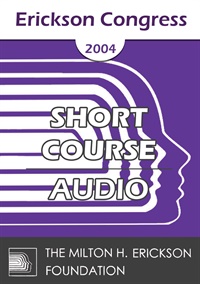
- Average Rating:
- Not yet rated
- Topic Areas:
- Short Courses | Borderline | Eating Disorders | Ericksonian Hypnosis and Therapy Techniques | Hypnosis | Personality Disorders | Addiction | Utilization
- Categories:
- Erickson Congress | Erickson Congress 2004
- Faculty:
- Ilana Oren, Ph.D., Sc.D., LMFT
- Duration:
- 1:19:45
- Format:
- Audio Only
- Original Program Date:
- Dec 02, 2004
- Short Description:
- Have you worked with the patient who one day idealized you and next devalued your skills? The Borderline, who finds refuge in food addiction. Borderline personality is an underlying character structure, marked by a fragmented sense of identity and maladaptive patterns of perceiving, behaving and relating to others. Food provides a soothing antidote to feeling of shame, betrayal and the longing for a positive mother. Ericksonian hypnosis paves the way to reach the habitually oppositional patient.
- Price:
- $15.00 - Base Price
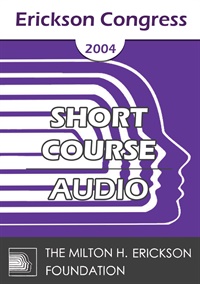
- Average Rating:
- Not yet rated
- Topic Areas:
- Short Courses | Hypnosis | Psychology | Ericksonian Hypnosis and Therapy Techniques
- Categories:
- Erickson Congress | Erickson Congress 2004
- Faculty:
- Joseph Dowling, MS, LPC
- Duration:
- 1:17:30
- Format:
- Audio Only
- Original Program Date:
- Dec 02, 2004
- Short Description:
- This workshop will describe a new approach to sport psychology, the SSHR model (stance, skill building, hypnosis, resource retrieval). It will focus on the clinical intervention of alert hypnosis, specifically eyes open, walking and talking in hypnosis as invaluable tools for the emerging athlete. Participants will be afforded the opportunity to learn this material via live demonstration, experiential exercise and case study.
- Price:
- $15.00 - Base Price
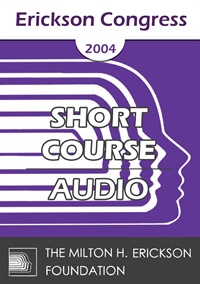
- Average Rating:
- Not yet rated
- Topic Areas:
- Short Courses | Ericksonian Hypnosis and Therapy Techniques | Solution Oriented Approach
- Categories:
- Erickson Congress | Erickson Congress 2004
- Faculty:
- Tifrah Warner, PhD
- Duration:
- 1:17:24
- Format:
- Audio Only
- Original Program Date:
- Dec 02, 2004
- Short Description:
- This course focuses on the client as a source of solutions. It will present three different ways to facilitate the emergence of a solution, and these will be illustrated with examples from Erickson's and the presenter's work. Participants will be given the opportunity to practice discriminating between the suitability of the three interventions and to apply one of them. Ownership of the solution carries with it a sense of confidence and independence for the client.
- Price:
- $15.00 - Base Price
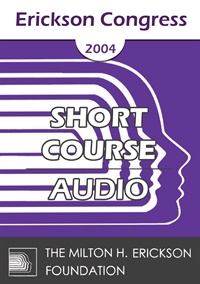
- Average Rating:
- Not yet rated
- Topic Areas:
- Short Courses | Mind-Body | Trauma | Brief Therapy | Ericksonian Hypnosis and Therapy Techniques | Trance | Hypnotic Induction | Pain and Healing | Hypnosis
- Categories:
- Erickson Congress | Erickson Congress 2004
- Faculty:
- Ronald Alexander, PhD | Anita Jung, M.S.
- Duration:
- 1:19:45
- Format:
- Audio Only
- Original Program Date:
- Dec 02, 2004
- Short Description:
- This workshop will address the rapid treatment of trauma and psychosomatic disorders by utilizing an Ericksonian orientation that understands the importance of the symptom as a pathway to inner healing. The skills needed for the rapid treatment of trauma will be reviewed. The course will highlight Ericksonian methods for the immediate reorganization of transforming somatic-affective experience into new healing rhythms in the body.
- Price:
- $15.00 - Base Price
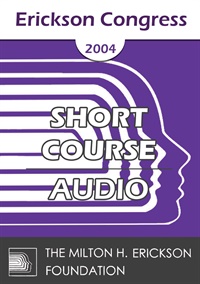
- Average Rating:
- Not yet rated
- Topic Areas:
- Short Courses | Ericksonian Hypnosis and Therapy Techniques | Relationships | Aging and Mortality | Hypnosis
- Categories:
- Erickson Congress | Erickson Congress 2004
- Faculty:
- Savine Gross Weizman, PhD
- Duration:
- 1:19:45
- Format:
- Audio Only
- Original Program Date:
- Dec 02, 2004
- Short Description:
- Mourning the loss of a loved one is a normal and natural progress. Unfinished business often exists which holds the individual back from healthy resolution of the loss. Lack of closure may result from a sudden death with no opportunity to say goodbye or unresolved issues. Using hypnosis, we can revisit the deceased and address unfinished business, thus facilitating a resolution and healing of the relationship and allowing the mourner to move on to recovery.
- Price:
- $15.00 - Base Price
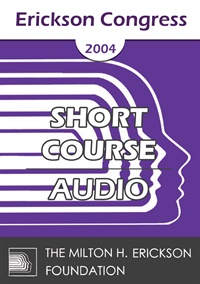
- Average Rating:
- Not yet rated
- Topic Areas:
- Short Courses | Couples Therapy | Ericksonian Hypnosis and Therapy Techniques | Sex and Sexuality | Hypnosis
- Categories:
- Erickson Congress | Erickson Congress 2004
- Faculty:
- Helen Adrienne, LCSW, BCD
- Duration:
- 1:19:24
- Format:
- Audio Only
- Original Program Date:
- Dec 02, 2004
- Short Description:
- Any life crisis can render a person metaphorically infertile. Using the frenzy of literal infertility as a springboard, this workshop will offer participants the opportunity, in trance, to explore personal circumstances and universal elements of infertility of any kind. The hypnotic process will aim to facilitate the creation of the eye of the storm, and aim to locate the powerful presence of the "I" which often gets shattered in the frenzied state.
- Price:
- $15.00 - Base Price
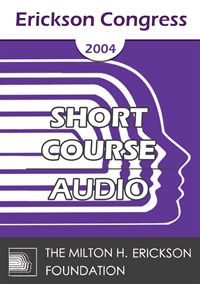
- Average Rating:
- Not yet rated
- Topic Areas:
- Short Courses | Anxiety | Ericksonian Hypnosis and Therapy Techniques | Hypnosis | Self-Hypnosis
- Categories:
- Erickson Congress | Erickson Congress 2004
- Faculty:
- Deborah Beckman
- Duration:
- 1:19:45
- Format:
- Audio Only
- Original Program Date:
- Dec 02, 2004
- Short Description:
- Traditional therapy presumes that treating anxiety produces healthier sleep without specific intervention. By shifting therapy to focusing on sleep first via collaborating on comforting bedtime stories, clients can rapidly acquire self-hypnosis skills for their present and future. This strategic process focuses on sleeplessness first by reframing the client's anxiety metaphorically, utilizing the client's strengths and recalling natural sleep rhythms.
- Price:
- $15.00 - Base Price
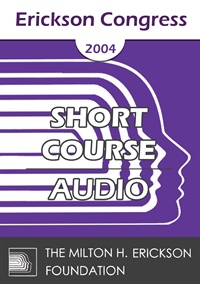
- Average Rating:
- Not yet rated
- Topic Areas:
- Short Courses | Trance | Utilization | Naturalistic | Ericksonian Hypnosis and Therapy Techniques | Resources
- Categories:
- Erickson Congress | Erickson Congress 2004
- Faculty:
- Halim Faisal, MSW | Diane Holliman, PhD
- Duration:
- 1:19:45
- Format:
- Audio Only
- Original Program Date:
- Dec 02, 2004
- Short Description:
- The presenters will describe specific strategies for naturalistic trance induction and utilization. Emphasis will be on the adaptation and application of brief Ericksonian techniques, methods of naturalistic trance induction, deepening techniques and process instructions utilized to stimulate participants into shifting their perceptual positions and thinking about things differently.
- Price:
- $15.00 - Base Price
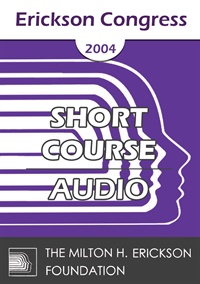
- Average Rating:
- Not yet rated
- Topic Areas:
- Short Courses | Mind-Body | Cognitive Behavior Therapy (CBT) | Ericksonian Hypnosis and Therapy Techniques | Psychotherapy
- Categories:
- Erickson Congress | Erickson Congress 2004
- Faculty:
- Bruce Gregory, PhD
- Duration:
- 1:19:45
- Format:
- Audio Only
- Original Program Date:
- Dec 02, 2004
- Short Description:
- Over the past 20 years Dr. Rossi has innovatively expanded Ericksonian work by demonstrating its connections to microbiology, chemistry, physics, chaos theory and mathematics. This course will explore the relationship and relevance of Dr. Rossi's mind- body work to other forms of psychotherapy. We will learn how mind-body work utilizes and integrates many of the core processes used in the work of Winnecott, Klein, Jung, Gestalt, Masterson, Kohut and cognitive-behavioral therapy.
- Price:
- $15.00 - Base Price

- Average Rating:
- Not yet rated
- Topic Areas:
- Short Courses | Ericksonian Hypnosis and Therapy Techniques | Hypnotherapy | Hypnosis | Social Issues
- Categories:
- Erickson Congress | Erickson Congress 2004
- Faculty:
- Halim Faisal, MSW | Diane Holliman, PhD
- Duration:
- 1:19:41
- Format:
- Audio Only
- Original Program Date:
- Dec 02, 2004
- Short Description:
- Hypnotherapy has been an under-used tool in social work. However, the principles of Ericksonian hypnotherapy are quite congruent with social work especially in serving at risk populations. Examples of how to use Ericksonian hypnotherapy and evaluate outcomes with at risk populations will be presented.
- Price:
- $15.00 - Base Price
Please wait ...

